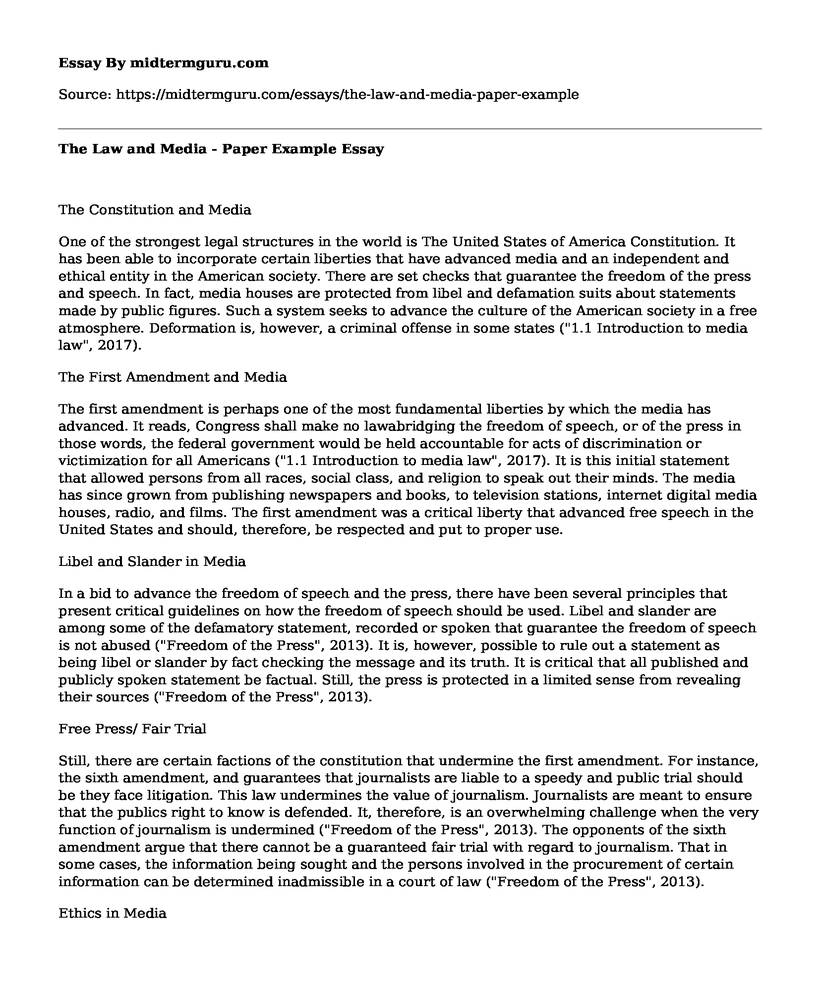The Constitution and Media
One of the strongest legal structures in the world is The United States of America Constitution. It has been able to incorporate certain liberties that have advanced media and an independent and ethical entity in the American society. There are set checks that guarantee the freedom of the press and speech. In fact, media houses are protected from libel and defamation suits about statements made by public figures. Such a system seeks to advance the culture of the American society in a free atmosphere. Deformation is, however, a criminal offense in some states ("1.1 Introduction to media law", 2017).
The First Amendment and Media
The first amendment is perhaps one of the most fundamental liberties by which the media has advanced. It reads, Congress shall make no lawabridging the freedom of speech, or of the press in those words, the federal government would be held accountable for acts of discrimination or victimization for all Americans ("1.1 Introduction to media law", 2017). It is this initial statement that allowed persons from all races, social class, and religion to speak out their minds. The media has since grown from publishing newspapers and books, to television stations, internet digital media houses, radio, and films. The first amendment was a critical liberty that advanced free speech in the United States and should, therefore, be respected and put to proper use.
Libel and Slander in Media
In a bid to advance the freedom of speech and the press, there have been several principles that present critical guidelines on how the freedom of speech should be used. Libel and slander are among some of the defamatory statement, recorded or spoken that guarantee the freedom of speech is not abused ("Freedom of the Press", 2013). It is, however, possible to rule out a statement as being libel or slander by fact checking the message and its truth. It is critical that all published and publicly spoken statement be factual. Still, the press is protected in a limited sense from revealing their sources ("Freedom of the Press", 2013).
Free Press/ Fair Trial
Still, there are certain factions of the constitution that undermine the first amendment. For instance, the sixth amendment, and guarantees that journalists are liable to a speedy and public trial should be they face litigation. This law undermines the value of journalism. Journalists are meant to ensure that the publics right to know is defended. It, therefore, is an overwhelming challenge when the very function of journalism is undermined ("Freedom of the Press", 2013). The opponents of the sixth amendment argue that there cannot be a guaranteed fair trial with regard to journalism. That in some cases, the information being sought and the persons involved in the procurement of certain information can be determined inadmissible in a court of law ("Freedom of the Press", 2013).
Ethics in Media
To manage the different competencies in the journalism profession, there are certain ethical codes that have been put in place to advance media and the freedom of speech. Journalists, in their professional capacities, are required to make certain decisions that ordinary citizens may not be able to do. The intent of such an institution is to ensure that sensitive and critical issues in society are expressed to the people in a peaceful manner. Media ethics captures this through four critical principles; truthfulness, fairness, and standards of decency ("Media Ethics: Truthfulness, Fairness, and Standards of Decency", 2017). It is from such principles that media houses manage conflict of interest in matters of national interest and mitigate sensationalism in their stories. In this sense, media ethics places guidelines for the practice of professional journalism.
References
1.1 Introduction to media law. (2017). Media Law and Ethics. Retrieved 1 March 2017, from http://revolutionsincommunication.com/law/?page_id=17
Media Ethics: Truthfulness, Fairness, and Standards of Decency. (2017). College.cqpress.com. Retrieved 1 March 2017, from http://college.cqpress.com/sites/masscomm/Home/chapter14.aspx
United States | Country report | Freedom of the Press | 2013. (2013). Freedomhouse.org. Retrieved 1 March 2017, from https://freedomhouse.org/report/freedom-press/2013/united-states
Cite this page
The Law and Media - Paper Example. (2021, Jun 07). Retrieved from https://midtermguru.com/essays/the-law-and-media-paper-example
If you are the original author of this essay and no longer wish to have it published on the midtermguru.com website, please click below to request its removal:
- Privacy Violation Rights by Government Intelligence and Security Organizations
- Duccio di Buoninsegna: The Nativity with the Prophets Isaiah and Ezekiel Painting
- Man in the Mirror by Michael Jackson Analysis
- Science and Fiction Films Response Paper Example
- Essay Sample on Classic 1960 Songs
- Research Paper on Literacy and Social Justice
- Movie Analysis Essay on Stolen Education







